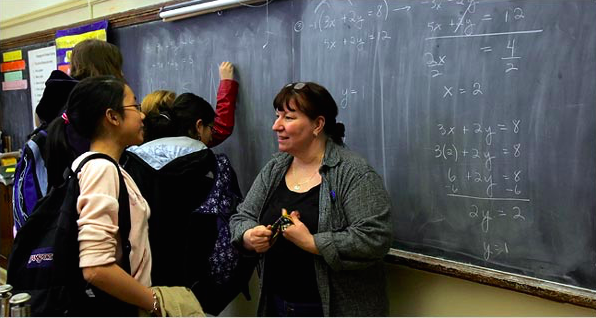The importance of teacher-child relationships during elementary school
Maldonado-Carreno, C., & Votruba-Drzal, E. (2011). Teacher-child relationships and the development of academic and behavioral skills during elementary school: A within- and between-child analysis. Child Development, 82(2), 601-616.
Introduction:
Teacher-child relationship quality in the early school years has been linked to child well-being in a variety of domains: peer relationships, behavior problems, classroom adjustment, and academic achievement (i.e., Birch & Ladd, 1998; Burchinal, Peisner-Feinberg, Pianta, & Howes, 2002). However, there has been little research examining the influence of teacher-child relationships beyond the second grade. The current study aims to advance the understanding of the long-term connections between a teacher-child relationship and a child’s academic and behavioral development throughout elementary school.
Method:
This study drew on data from the National Institute of Child Health and Human Development Study of Early Child Care and Youth Development, which is a large longitudinal study of non-parental care experiences and child development. 1,364 children were followed from 2nd grade through 6th grade. Academic achievement of the youth was measured using direct assessments and through annual teacher reports. Behavior problems were assessed by both the mother and teachers. Teacher-child relationship quality was assessed via teacher’s perceptions of the quality of their relationships with individual children; teachers answered questions on warmth, positive affect, open communication, and conflict. In addition, both child and mother demographic characteristics were taken into consideration. These variables were examined both within-in individual children and between groups of children.
Results:
- Teachers tended to rate a child more highly on language and literacy, as well as math skills when they had a more positive relationship with the child, however, average teacher-child relationship quality was not significantly associated with gains in academic achievement over time, when reported by the teachers.
- Within-child improvements in teacher-child relationship quality was associated with gains in teacher-reported academic skills in language and literacy.
- Children who had a more positive relationship with their teacher showed lower average levels of mother-reported internalizing and externalizing behavior problems.
- Improvements in teacher-student relationship quality predict declines in both mothers’ and teachers’ reports of internalizing behavior problems.
Conclusion:
Through its unique examination of both between and within-child associations among teacher-child relationship quality and a youth’s functioning, this study demonstrates the importance in quality of relationships reported by teachers on the trajectories of both academic achievement and behavior problems for youth from kindergarten through fifth grade. The study showed that teacher-youth relationships are important, “across elementary school for children to be able to organize and modulate their emotions, conform to rules, and effectively interact with others both at home and in school.”
There appears to be an important reciprocity between teacher-student relationship quality and youth outcomes, while some argue that teacher’s tend to develop higher quality relationships with students who are more engaged in the classroom, it is also suggested that teacher-child relationships may “motivate children to achieve academic outcomes because the children may want to please their teacher with whom they have good relationships by completing homework, engage in academic activities, and being helpful in the classroom.” This type of relational reciprocity can also be seen as a critical element in quality mentoring relationships.
In light of the major focus on classroom-level practices and activities, this study provides evidence and an important reminder for policy-makers and practitioners alike, to not neglect the promise of teacher-student relationships as a potential avenue for academic success and behavioral competence among children.
This article was summarized by UMB doctoral student Laura Yoviene















